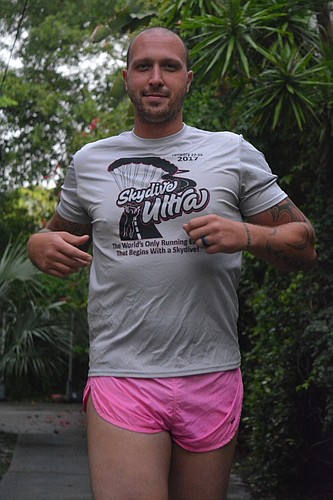- November 23, 2024
-
-
Loading

Loading

Have you seen him?
The guy in the pink shorts, I mean. The 6-foot-4, 230-pound man with an uncountable number of tattoos (they bleed into each other, he said) who runs in neon pink booty shorts?
If you have, you’d remember, and that’s exactly what Stephen Kelley wants.
Going by the quite literal moniker That Guy In The Pink Shorts on social media, Kelley runs marathons of all kinds, including ultramarathons. Since 2016, he’s run them in his signature shorts. It’s not because he likes them. In fact, he finds them embarrassing. (There’s a potential pun in that last sentence I so badly wanted to make, but it would never fly. You can find it on your own).
“I feel uncomfortable all the time,” Kelley said. “They’re very short, and there’s a lining in them, so you don’t wear underwear or anything. I feel very free. From behind, they get shorter as the race goes on. I make the joke that if people don’t like the view from behind, they better run faster. I’m their pace coach.”
So why does he wear them?
Well, Kelley has always been a man willing to give back to the community. He and his wife, Claire Kelley, have a fitness business in Sarasota, 360 Degree Health. They have run charity fitness bootcamps with GNC, raising money for a local family and gathering clothes or whatever else the family needs. They want to do more, but it’s difficult to do large-scale things on their own.
In the small ultramarathon community, lots of people have an “image,” Kelley said, and he wanted one of his own. One day while he and Claire were in St. Augustine, the pair spotted those pink shorts in a store, and bought them as a joke. Kelley wore them to 360 Degree Health, and people laughed. Then he wore them to a race, and people laughed harder. He was getting asked to take pictures with everyone. He realized there was no possible way he could stand out more than he did while wearing the shorts. This was a perfect “image” for him. He also realized his new look as an opportunity to do more good.
Aside from the fitness business, Kelley works as a child-protection investigator. He’s seen what happens to kids in foster care. He’s seen abuse. He’s well aware that between four and seven children die from abuse or neglect in the United States each day, according to a 2014 CDC study, and that 3.6 million referrals are made to child-protection agencies, with those referrals involving more than 6.6 million children. He cares deeply about children, and has two of his own, 4-year-old twin boys Langston and Kingston. When he heard about Comfort Cases, a charity based in Gaithersburg, Md., that is attempting to go national, he knew he had found his cause.
Founded by Rob Scheer, Comfort Cases packs and distributes overnight bags filled with essential and comfort items to children entering the foster care system and to other at-risk youth, according to its website. Those items include pajamas, a blanket, a stuffed animal, a book, a dental kit, a hygiene kit, and a fun activity (a coloring book or journal, etc.). These bags replace the often-typical method of bringing a child’s things to a foster care home, which is in a trash bag.
“It’s amazing to me that we’re still handing out trash bags.” Kelley said. “We’re still going, ‘Here, throw your stuff in this. You’re leaving. You’re going somewhere else with people you don’t know, and we’re going to take all the stuff you love and put it in a trash bag, and that’s how you’re going to transport it.’ That sends a really strong message to that child. That’s what we think about your stuff, basically.
“Comfort Cases gives these kids some dignity. It tells them, ‘Look, your stuff is not trash. You are not trash. The situation sucks, but it’s not your fault.’”
After a few conversations with Scheer, Kelley is now an official Comfort Cases partner, and will look to help the charity’s work in Florida. Every time he runs a marathon, posts on social media, or wears the shorts to 360 Degree Health, he’s raising awareness for the cause. That’s not enough, though. He’s noticed other trendy social media movements that state awareness for a cause as their reason for being, but don’t actually do anything to make a tangible difference.
“I want to bridge the gap between awareness and action,” Kelley said. “It goes back to the old phrase, ‘put your money where your mouth is.’”
He doesn’t have a specific goal in mind, but he wants That Guy In The Pink Shorts — and therefore Comfort Cases — to be as big as it can possibly be. He also wants this to be a community effort, with people doing whatever they feel they can offer to spur people into action.
“I’m not looking for my face to be out there,” Kelley said. “I’m more looking for the shorts to be. It’s not about me. It’s about getting attention and transferring that to Comfort Cases and the foster care system.”